Any Nuclear Deal With Iran Won't Deter Israel
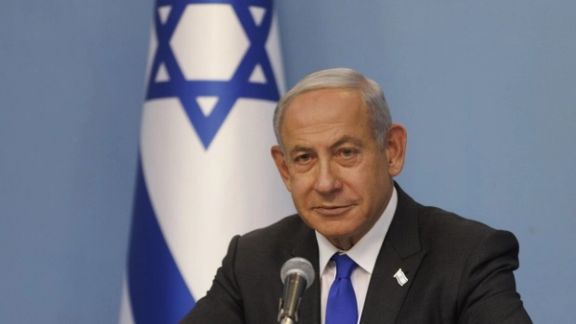
Israeli Prime Minister Benjamin Netanyahu reaffirmed Israel's Iran strategy despite Biden's recent nuclear deal efforts.

Israeli Prime Minister Benjamin Netanyahu reaffirmed Israel's Iran strategy despite Biden's recent nuclear deal efforts.
In an interview with Newsmax on Monday, he reiterated his policy on Iran, its most dangerous enemy in the Middle East, and said he will not be deterred by the Biden administration's efforts to restart a nuclear deal with Iran.
"Israel will do what it needs to do to defend itself by itself against the threat of Iran to annihilate it with nuclear weapons," Netanyahu told Rob Schmitt Tonight.
The Biden administration has been striving to bring the United States back into the Joint Comprehensive Plan of Action (JCPOA), a deal that was previously abandoned under the Trump administration. Talks are also said to be addressing the release of some of the US citizens detained in Iran and unfreezing some Iranian assets. It has been met with fierce opposition on both sides of Congress and since the latest talks began in June, maritime tensions continue between the two arch-enemies in the Persian Gulf.
Netanyahu said of the ongoing US talks: "I think that any deal with Iran that doesn't set back Iran's nuclear infrastructure is basically not worth it because it means nothing ... They basically take what you give them, but they don't set back. They don't roll back the capacity to produce nuclear weapons or the components of nuclear weapons. So, you really get nothing for it. And my view hasn't changed."
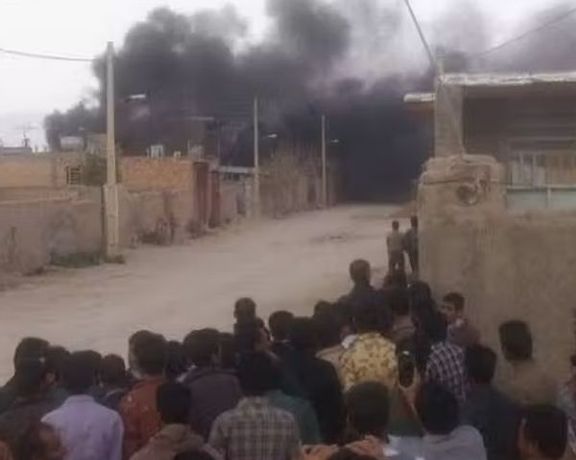
The IRGC surrounded a village in Iran’s West Azarbaijan province after clashes erupted between civilians and security forces.
Violence broke out after residents of Agh-Darreh village in Takab had protested the arrest of family members in front of the governorate of Takab city. In what is believed to have been a case of excessive force, police and security forces turned violent, causing the IRGC to send troops to surround the village.
Hengaw Human Rights Organization reported that the situation escalated with over 50 Kurdish citizens being arrested and more than 10 people sustaining injuries. Furthermore, dozens of other citizens have sought refuge in the surrounding mountains, fearing arrest.
The majority of Iran's 10 million Kurds live in the western parts of the country, which has been subject to consistent suppression from security forces in the wake of Kurdish-Iranian Mahsa Amini's death in morality police custody. It has been the scene of numerous violent protests and even more brutal crackdowns by the regime with hundreds believed to have been killed in state-sanctioned violence.
The area's residents were also protesting a lack of jobs at the local gold mine, with the villagers among some of Iran's poorest citizens. Despite promises of employment from provincial authorities, the situation remains unresolved and the economic situation worsening.
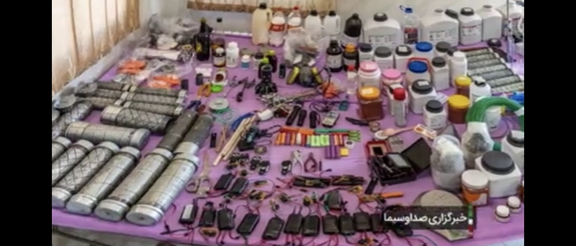
Iran claims to have smashed a network of “terrorists” across six provinces, whose handlers are in Denmark and the Netherlands, according to the government's news agency, IRNA.
In a lengthy article, quoting Iranian intelligence organizations, IRNA says that the conspiracy’s aim was to launch terror attacks during last week’s Muharram Islamic Shiite mourning events, marked by days of public gatherings in streets and mosques.
The report, blaming “Zionists” for organizing the network, claims that 43 bomb attacks were planned, including the bombing of IRGC General Qassem Soleimani’s mausoleum in Kerman — the architect of Iran’s military and intelligence network across the Middle East, killed in a US drone strike in January 2020 ordered by then-president Donald Trump.
Praising the quality of Iran's "intelligence aristocracy", the discovery it says, "is a sign of the undeniable authority of this institution in thwarting terrorist plans, and on the other hand, it shows the loss of the intelligence authority of the Zionist regime".
IRNA, a mouthpiece for the regime's top brass, claimed that the nature of the terrorists' employers has been known for years. "No one doubts the Zionist regime's [Israel] covert and hidden involvement in this matter," it claimed, threatening that the actions would reap repercussions for Israel's allies in Europe.
IRNA went on to claim that a large quantity of material related to bomb-making was uncovered in safe houses, along with weapons and accessories for street protests.
The Iranian regime occasionally makes claims of arresting terrorists and spies -- especially citing alleged Israeli intelligence agents — and uncovering caches of weapons and explosives, but rarely provides concrete details or names and affiliations of the supposed saboteurs. Court appearances of detainees or news about trials are rare and verification of these claims are impossible.
It is the second time in a matter of days that the regime has issued veiled threats to Denmark. Only last week, Iranian officials warned Denmark not to allow any acts of desecrating the Quran after several people burned the Muslim holy book in Sweden.
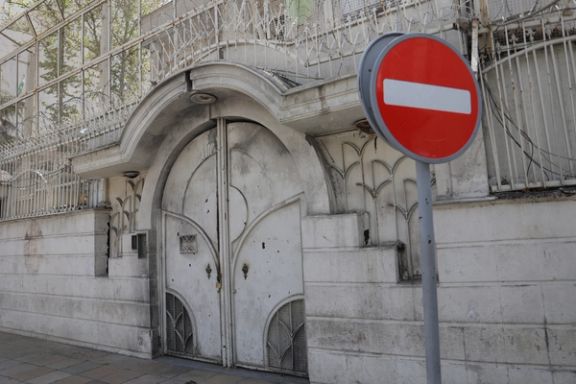
The anticipated reopening of the Saudi Embassy in Tehran, as part of an agreement to restore diplomatic relations, has faced further delays.
The agreement, signed in March in Beijing, stipulated that the two countries would reopen their embassies within two months. However, the timeline for the reopening of the Saudi embassy in Tehran remains unclear. Alireza Enayati, the designated Iranian ambassador to Riyadh, said that the Saudi embassy will reopen but "at a time they see fit."
Enayati expressed his observations on Saudi Arabia's approach, stating, "what we see from the notes and actions of Saudi Arabia is that the country is trying to open its embassy when it suits them." Despite not yet submitting his credentials to the Saudi authorities after being appointed as ambassador, Enayati remains hopeful for progress.
The Iranian Embassy in Saudi Arabia was reopened in mid-June, following a one-month delay, marking the restoration of diplomatic relations after seven years of closure.
In response to repeated postponements, some media outlets speculated that the Saudi embassy might reopen after the religious holiday of Eid al-Adha in late June. However, the Saudi authorities have yet to offer any official explanation regarding the possible reopening of their embassy in Tehran.
Recent reports indicated the deployment of Saudi diplomats to the Espinas Palace Hotel in Tehran's north. Jahan Sanat newspaper highlighted the hotel's strategic advantage for embassy personnel and diplomats, as it includes a helipad that enhances their security during potential emergencies or attacks.
However, the Iranian Foreign Ministry spokesperson has raised concerns about the potential establishment of relations between Saudi Arabia and Israel and how that may impact Iran. These comments come in line with comments from US President Joe Biden who indicated that an agreement on the normalization of relations between Saudi Arabia and Israel is likely.
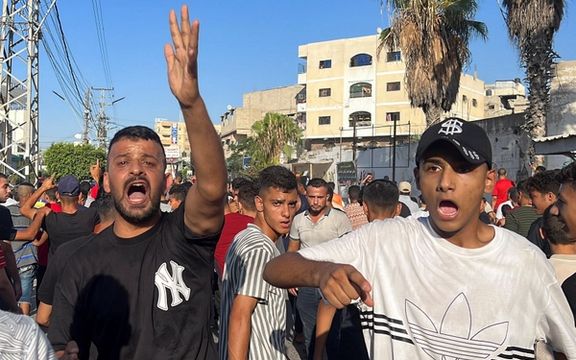
A group of children openly mocked Hamas during a demonstration in Gaza on Sunday, provoking threats to journalists.
A video on social media shows the children chanting "Shia! Shia!" in reference to Hamas' alleged ties with Shiite Iran.
Amidst the demonstration, Ihab Fasfous, a veteran Gaza journalist, found himself at the center of a confrontation with Hamas, the governing authority in the Gaza Strip.
According to witnesses, he was threatened twice by the authorities and then demanded to see identification documents of those making the threats. Despite this, he was later arrested by Hamas.
The situation has raised concerns among media organizations, particularly the Palestinian Journalists Syndicate, which has strongly condemned the actions of Hamas security forces against impartial reporters. In a statement, the syndicate also addressed an incident involving journalist Walid Abdel Rahman, a prominent member of the General Secretariat of the syndicate. Rahman, a correspondent for Palestine TV was reporting on a march in Jabalia refugee camp when he was beaten by Hamas security forces. This incident reflects a growing pattern of preventing journalists from performing their duties and covering peaceful marches across the Gaza Strip.
The Palestinian Journalists Syndicate said, "We strongly condemn the attack by Hamas security forces on journalist Walid Abdel Rahman. It is unacceptable that journalists are being subjected to violence and intimidation while simply doing their job. The syndicate stands in solidarity with all journalists facing such threats and calls for their immediate release."

Iran's has once again warned regional countries against normalizing relations with Israel as efforts intensify to expand the Abraham Accords to include Saudi Arabia.
During his weekly press conference Monday, Nasser Kanaani, the spokesperson of Iran's foreign ministry, said that normalization of ties between Saudi Arabia and Israel would harm regional peace and stability.
His remarks came as US President Joe Biden said July 28 that a deal may be on the way after talks his national security adviser held with Saudi officials in Jeddah on the issue.
The Islamic Republic, Israel's sworn enemy, has always opposed normalization of relations between Arab countries and the Jewish state. The regime has repeatedly described the two-state solution – perhaps the only peaceful way to resolve the conflict between Israel and Palestinians -- as a betrayal of the ‘Palestinian cause.’ Top Iranian officials in the past have called for the annihilation of "the Zionist entity.".
“It is quite clear that strengthening and stabilizing the position of the Zionist regime in the region has been America's first priority for many years," Kanaani said, noting that the United States has succeeded in establishing relations between Israel and several regional countries. “But what happened in practice was allowing the Zionist regime to increase its crimes against the Palestinian nation,” he claimed.
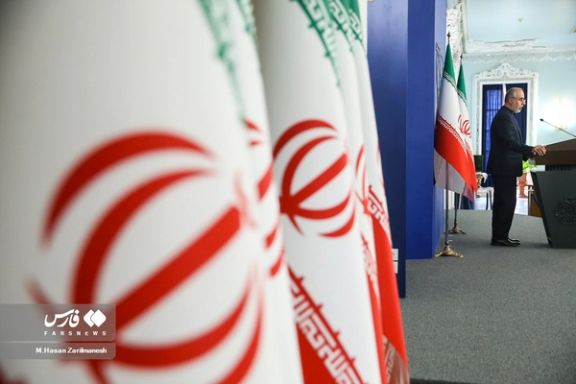
“Peace with the Zionist regime will not help the Palestinian nation; Iran considers any step taken towards the recognition of the regime neither in the interest of Palestine nor in the interest of peace and security in the region,” Kanaani said in a tacit threat that could potentially lead to further unrest in the region by Tehran’s proxies.
In June, Jaber Rajabi, a political analyst and activist, told Iran International that although the Islamic Republic seeks to portray itself as sympathetic to the Palestinians and championing their cause, it never supports those Palestinians who seek peace and stability, such as the Palestine Liberation Organization, and only supports militant groups.
Rajabi said that the Islamic Republic is not committed to what he described as the Palestinian cause, noting that the regime views the Palestinian issue as a bargaining chip. Among the few cards that the Islamic republic can play in the international arena is fomenting unrest in Israel, he claimed, adding that the regime believes it can only make gains if there is a crisis.
In April, Supreme Leader Ali Khamenei claimed that Israel is on the defensive, and the United States has suffered major setbacks and consecutive defeats in the region.
During the Monday press briefing, Kanaani also claimed that Iran is pursuing a policy of good neighborliness and seeks to resolve disputes with neighboring states through dialogue. However, he reiterated that the regime will not tolerate a violation of its rights over a disputed Persian Gulf natural gas field shared with Kuwait and Saudi Arabia.
Called Arash in Iran and Durra or Dorra by Saudi Arabia and Kuwait -- the offshore field was discovered in 1967 and is estimated to have a total proven reserves of around 310 million barrels of oil and 20 trillion cubic feet of gas. Kuwait and Saudi Arabia insist that Iran has no right over the field, claiming “exclusive” right, while Iran says any development without its consent is “illegal” according to international laws as it claims 40 percent of the field located in its territorial waters.
“Iran believes that such issues should be discussed within the framework of technical, specialized, and legal negotiations and that it is not helpful to raise them in the media,” Kanaani emphasized.
His remarks – as well as similar ones by the country’s oil minister on Sunday – came after Kuwait's oil minister Saad Al Barrak told SkyNews Arabia July 27 that his country will start drilling and begin production at the gas field without waiting for border demarcation with Iran, reiterating the two Arab countries’ position that Iran must validate its claim to the field by demarcating its own maritime borders first.
As controversies surrounding the case are escalating, the disputed maritime field in the Persian Gulf has become a litmus test for the recent détente between Tehran and Riyadh.